Matalon disappointed with 'fairly narrow range' of taxes
Published: Monday | December 21, 2009

Joseph Matalon, president of the Private Sector Organisation of Jamaica. - File
President of the Private Sector Organisation of Jamaica (PSOJ), Joseph M. Matalon, sees the Government's latest tax package as "necessary", in light of the impact of the global economic crisis on Jamaica.
Matalon told the Jamaica Information Service that the tax package was "very significant" and "perhaps one of the largest in the history of the Jamaican economy", but cited it as necessary under the current circumstances.
"These are, in fact, tough times and tough measures are required in tough times," he said.
Matalon, who is also chairman of the ICD Group, chaired the Tax Policy Review Committee appointed by former Minister of Finance and Planning, Dr Omar Davies, which examined each of the main sources of tax revenue and their impact on the economy and handed in a report to Government in November 2004.
That committee also comprised 12 professionals from the private and public sectors and the trade unions, and included Dr Wesley Hughes, accountants Ethlyn Norton-Coke, Elizabeth Jones-Kerr, Eric Crawford, Allison Peart and Wildred Bagaloo, attorney-at-law Mark Golding and trade unionist Lloyd Goodleigh.
More revenue needed
"I believe that there is recognition among the (private sector) membership, including our (PSOJ) association membership, that tough measures were required, and I think it was anticipated that, in addition to those initiatives already announced - that are designed to compress the level of public expenditure - there was going to be the need to raise significant additional revenue," he said.
The PSOJ president noted that measures, such as the increase in the GCT rate and the widening of the tax base via the removal of exemptions, were recommended in a 2004 report.
He was, however, disappointed that there was not a more aggressive widening of the tax base.
"We believe that the Government may find that there are diminishing returns in terms of revenue performance from increases in the rate of GCT, and that it would have been much more efficient, from an economic standpoint, to have even further widened the base and use the additional revenue generated to actually reduce the rate of GCT," he contended.
He said one of the PSOJ's main disappointments with the announcement was the "fairly narrow range" of taxes targeted, rather than a more "comprehensive approach" to incorporate various other tax inputs and regimes, such as corporate and personal income tax and property tax.
"The property tax is a tax that has underperformed for many years. The level of compliance has been very low - something on the order of about 40 per cent, I believe. So we would have liked to have seen measures designed to address the performance of property tax," he said.
Recommendations
Matalon alluded to the impending increase in the personal income tax threshold to just over $440,000, effective January 1, 2010, pointing to its consistency with a recommendation for a "very significant increase" in this area.
"We had also recommended, as a part of the Tax Reform Committee's report, that the threshold be subsequently indexed either to inflation or to the exchange rate, in order to maintain its value over time, but that has not been done," he pointed out.
Other recommendations Matalon contended should be considered, include: unification of the tax structure; and simplifying it in the process; and a more comprehensive reform of the tax regime across all of the various tax types.
' ... The Government may find that there are diminishing returns in terms of revenue performance from increases in the rate of GCT, and that it would have been much more efficient ... to have even further widened the base ...'


















